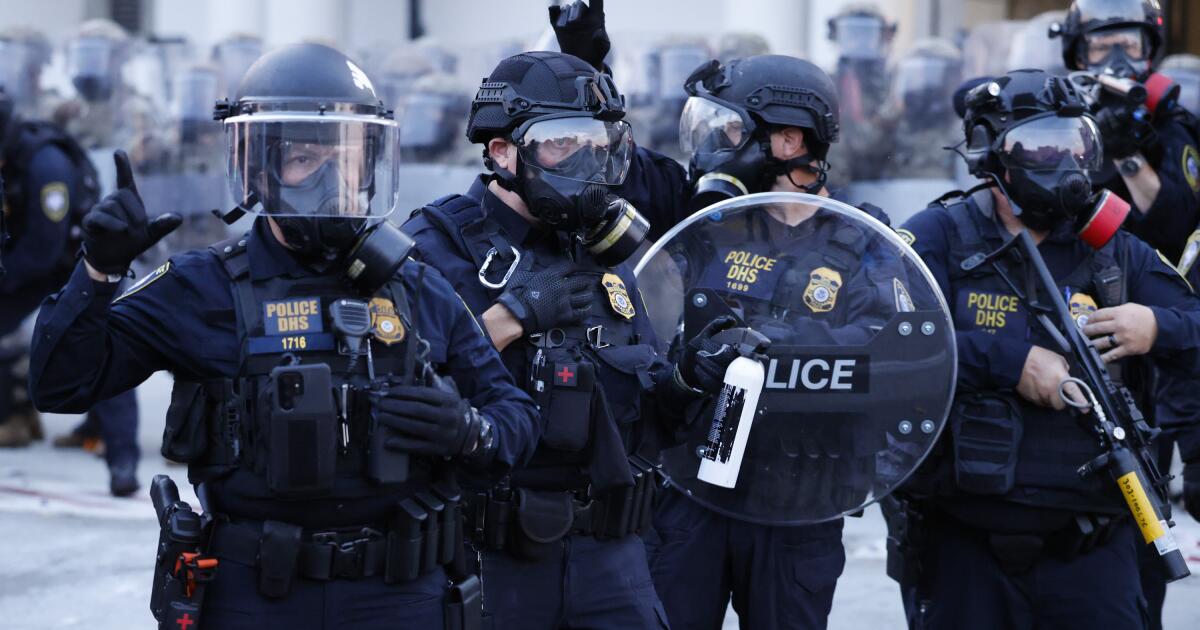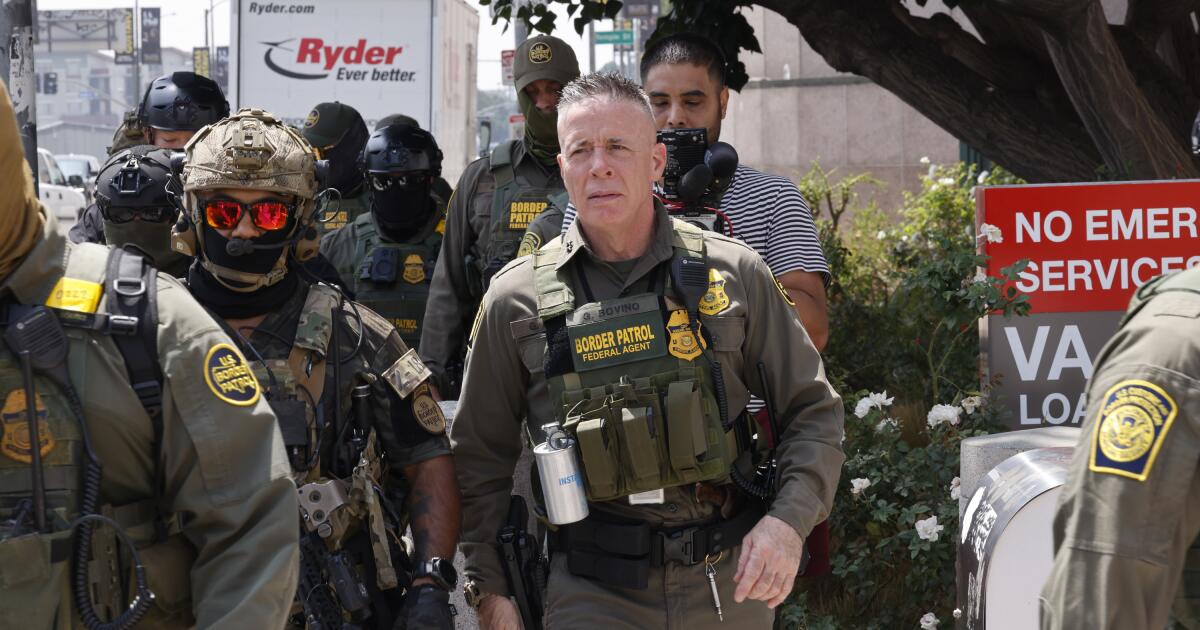Critics fault Supreme Court for allowing immigration stops that consider race and ethnicity
WASHINGTON — Fifty years ago, the Supreme Court ruled unanimously that U.S. Border Patrol agents violated the Constitution when they stopped a car on a freeway near San Clemente because its occupants appeared to be “of Mexican ancestry.”
The 4th Amendment protects Americans from unreasonable searches, the justices said then, and a motorist’s “Mexican appearance” does not justify stopping them to ask about their immigration status.
But the court sounded a decidedly different note on Monday when it ruled for the Trump administration and cleared the way for stopping and questioning Latinos who may be here illegally. By a 6-3 vote, the justices set aside a Los Angeles judge’s temporary restraining order that barred agents from stopping people based in part on their race or apparent ethnicity.
“Apparent ethnicity alone cannot furnish reasonable suspicion,” said Justice Brett M. Kavanaugh. “However, it can be a relevant factor when considered along with other salient factors.”
Critics of the ruling said it had opened the door for authorizing racial and ethnic bias.
UCLA law professor Ahilan Arulanantham called it “shocking and appalling. I don’t know of any recent decision like this that authorized racial discrimination.”
Arulanantham noted that Kavanaugh’s writings speak for the justice alone, and that the full court did not explain its ruling on a case that came through its emergency docket.
By contrast, he and others pointed out that the court under Chief Justice John G. Roberts Jr. prohibited the use of race or ethnicity as a factor in college admissions.
“Eliminating racial discrimination means eliminating all of it,” Roberts wrote for a 6-3 majority in 2023. That decision struck down the affirmative action policies at Harvard and the University of North Carolina.
“Today, the Supreme Court took a step in a badly wrong direction,” Ilya Somin, a George Mason University law professor, wrote on the Volokh Conspiracy blog. “It makes no sense to conclude that racial and ethnic discrimination is generally unconstitutional, yet also that its use is ‘reasonable’ under the 4th Amendment.”
Reports had already emerged before the decision of ICE agents confronting U.S. citizens and lawful permanent residents before they have been able to prove their status, compelling many to begin carrying documentation around at all times.
In New York on Monday, one man outside a federal court was pushed by ICE agents before being able to show them his identification. He was let go.
Asked by The Times to respond to increasing concern among U.S. citizens they could be swept up in expanded ICE raids as a result of the ruling, White House Press Secretary Karoline Leavitt said Tuesday that individuals should not be worried.
She added that immigration agents conduct targeted operations with the use of law enforcement intelligence.
“The Supreme Court upheld the Trump administration’s right to stop individuals in Los Angeles to briefly question them regarding their legal status, because the law allows this, and this has been the practice of the federal government for decades,” Leavitt said. “The Immigration and Nationality Act states that immigration officers can briefly stop an individual to question them about their immigration status, if the officer has reasonable suspicion that the individual is illegally present in the United States. And reasonable suspicion is not just based on race — it’s based on a totality of the circumstances.”
On X, the House Homeland Security Committee Democrats responded to Leavitt’s comments, writing: “ICE has jailed U.S. citizens. The Trump Admin is defending racial profiling. Nobody is safe when ‘looking Hispanic’ is treated as probable cause.”
Justice Sonia Sotomayor in her dissent pointed out that nearly half of the residents of Greater Los Angeles are Latino and can speak Spanish.
“Countless people in the Los Angeles area have been grabbed, thrown to the ground and handcuffed because of their looks, their accents, and the fact that they make a living by doing manual labor,” she wrote. “Today, the Court needlessly subjects countless more to these exact same indignities.”
At issue in the case was the meaning of “reasonable suspicion.”
For decades, the court has said police and federal agents may stop and question someone if they see something specific that suggests they may be violating the law.
But the two sides disagreed over whether agents may stop people because they appear to be Latinos and work as day laborers, at car washes or other low-wage jobs.
President Trump’s lawyers as well as Kavanaugh said agents may make stops based on the “totality of the circumstances” and that may include where people work as well as their ethnicity. They also pointed to the data that suggests about 10% of the people in the Los Angeles area are illegally in the United States.
Tom Homan, the White House border advisor, said that the legal standard of reasonable suspicion “has a group of factors you must take into consideration,” adding, “racial profiling is not happening at all.”
It is a “false narrative being pushed,” Homan told MSNBC in an interview, praising the Supreme Court decision. “We don’t arrest somebody or detain somebody without reasonable suspicion.”

